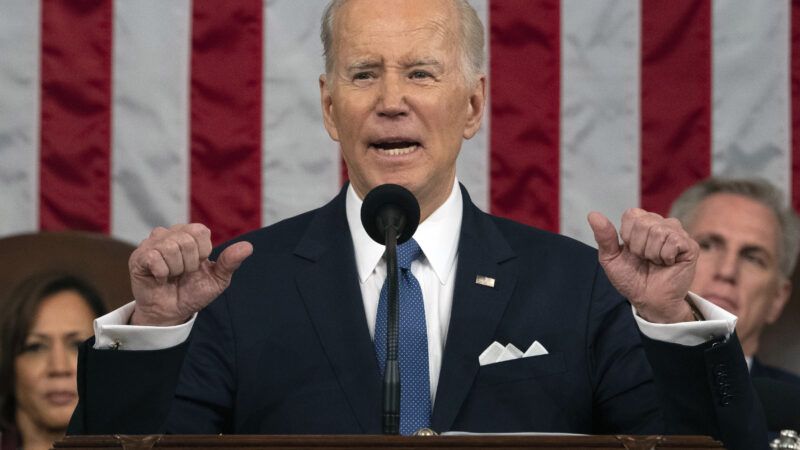Biden's Drug Price Controls Will Kill More Patients in the Long Run
And increase total health care costs to boot.

Federal government interference has massively distorted American health care costs for decades. In his State of the Union address on Tuesday, President Joe Biden touted how the misnamed Inflation Adjustment Act (IRA) will further warp medical care costs by "finally giving Medicare the power to negotiate drug prices." The result is essentially putting price controls on prescription drugs. And price controls will do for prescription drugs what they do for all other products upon which they are imposed: create shortages, queues, black markets, and rationing.
Even worse, drug price controls will have the additional baleful effect of increasing disease, disability, and deaths while simultaneously raising the total costs of health care. How? Because price controls substantially reduce the incentives for pharmaceutical and biotechnology companies to research, develop, and deploy innovative new medicines that would prevent and cure illnesses and cut overall costs.
These are the conclusions of a November 2021 study by the University of Chicago economist Tomas J. Philipson and his colleagues that analyzed the impact of the IRA on biopharmaceutical innovation and patient health. The study calculated that through 2039, the IRA will reduce pharmaceutical revenues by 12 percent, resulting in research and development (R&D) spending being cut by $663 billion. According to the authors, the decreased R&D spending would lead to 135 fewer new drug therapies, resulting in a potential loss of around 331 million patient life years through 2039. In comparison, through January 2022, the COVID-19 pandemic had resulted in the loss of about 13.5 million life years in the United States.
Biden also asserted that new price controls on prescription medicines "will cut the federal deficit, saving taxpayers hundreds of billions of dollars on the prescription drugs the government buys for Medicare." Maybe so, but an August 2022 study by Philipson and his colleague calculates that what Medicare and other health care payers might save on prescription drugs over the next 20 years will be more than offset by increased spending on other sorts of medical care.
That study analyzed data showing how over time, the development of new drugs has significantly reduced overall health care costs from what they otherwise would have been. The researchers find that new drugs save money by reducing the need for other costly treatments such as hospitalization, surgeries, and disability care. Applying those findings to the consequences of developing 135 fewer drug therapies through 2039, the researchers calculate that the "average increase in total health care spending would be about $50.8 billion over a 20-year period."
The actual way to lower prescription drug prices and incidentally slow health care cost increases while maximizing patient outcomes is to increase competition. This can be accomplished by speeding up Food and Drug Administration approvals and reining in patent abuses and other drug company shenanigans such as paying off would-be competitors to delay introducing generic versions of their patented drugs. Biden's drug price controls will instead decrease patient welfare and increase overall health care spending. That's a lose-lose for us all.


Show Comments (92)